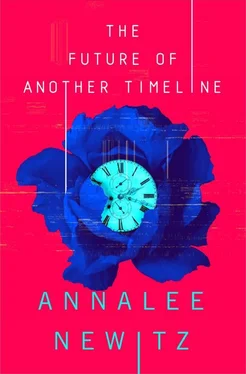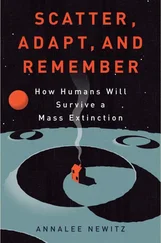We rolled up to the airport terminal, a long brick building with four gates that mostly serviced puddle jumpers to Winnipeg and Saskatoon. I had a couple hours to kill before a tiring series of flights and layovers, so I poked idly through my e-mail and news alerts. A story was bubbling up from the conspiracy networks about how a traveler from the 2020s had caused climate change by going back in time and teaching people to use fossil fuels. I rolled my eyes. If only it were that simple.
As travelers, we could observe, maybe spy, and sometimes save a life. But centuries of scientific inquiry suggested that it was extremely difficult for one person to alter the timeline in all but the most superficial ways. You couldn’t cause the world to industrialize before the eighteenth century, nor could you change the fate of nations by assassinating a famous leader. After killing the nineteenth-century tyrant Emmanuel, travelers were frustrated to find that Napoleon laid waste to Europe instead. It was the same discovery that travelers from the Tang Dynasty had made centuries before. There was no way to stop the Sogdian warlord An Lushan’s rebellion. Slaying one Sogdian warlord simply spawned another who rose against the emperor. An Lushan was the third one to rise; his sack of the legendary city of Chang’an could not be edited from the timeline.
Geoscientists of the early twenty-first century eventually settled on the theory that small things change but big things don’t. Trying to cause a significant divergence in the timeline was simply bad science, a honeypot for fools and failing tyrants. It was also against Chronology Academy regulations.
The Daughters of Harriet had a different theory. Call it a hypothesis if you must. Geologists agreed that the timeline was constantly in flux. Travelers exposed to edits returned with memories of lost histories, previous versions of the timeline they had witnessed. Agents and corporate operatives occasionally alluded to covert missions to shift the balance of power. Ancient scrolls contained references to travelers offering magical revelations that changed people’s fates. It seemed obvious to the Daughters that we lived in a heavily edited timeline, and that small changes could add up to something bigger.
One did not admit that at academic conferences, however, so we had a cover story. The Daughters of Harriet had an official name, the Applied Cultural Geology Group, with the mandate to observe major social transformations as they happened in the past. We’d been recognized as a legitimate scholarly organization by the American Geophysical Union, which made it easier to apply for grants and schedule trips on the Machines. Every month we had a research meeting at my best friend Anita’s house in Brentwood, close to the UCLA campus where we worked. There, we did a lot more than share discoveries and scotch. We made plans to edit history.
* * *
Los Angeles glowed with smoky orange light as we touched down. Fire season had come early this year, and it was yet another reminder that I was back home in 2022, when industrialization meant dystopia rather than progress. I caught a rideshare to Anita’s place and felt the familiar dislocation of homecoming as we rolled past bungalows with high-performance windows and fake lawns. After years spent in the past, it was hard to feel like the present was anything more than ephemeral. Everywhere I looked, I saw previous versions of the city: these streets were once ruled by horse-drawn wagons, then cable cars, then finned Chevy convertibles full of kids in zoot suits inching past giant movie theater marquees. Today we drove through merely one version of Los Angeles, balanced in a precarious moment, and always on the brink of disappearing.
When I arrived, Anita was putting out cheese and crackers, her flip-flops smacking the tile floor as she wandered between kitchen and living room. Snowy dreads fell in an elegant cascade around her dark, angular face. Hugging her, I felt something solid for the first time since returning to my present.
“How was your trip?”
I dumped my backpack on the sofa and flopped next to it. “Tiring. Weird.”
Anita raised an eyebrow and put out a bottle of Balvenie. After the living room had filled with a dozen people, snacking and chatting, Anita called the meeting to order.
We always started by going around the circle, describing lost histories we remembered. There were many events that existed only in our memories because we’d been present for the edits. We recited these stories partly as a ritual, and partly to update each other on current research projects.
Enid got us started. “I remember the Family Tax Reform Bill of 1988, which gave tax breaks to any family where the women could prove they had quit their jobs to become homemakers.” That was a new one for me. Enid, a Chinese American woman with salty hair cut into a dapper fade, had recently gotten back from the late eighties. There were murmurs of thanks from the group for deleting that particular gem out of our current version.
“I remember this café chain called Farrell’s that used to have outlets all over L.A.” Shweta reported her memory with a puzzled face. “Now it’s gone. It seems like there are more Starbucks, too, but it’s hard to tell.”
“Wait—why would a café chain disappear? Did you travel to the period when it first opened, or do something to the people who worked there?” C.L. always asked questions like that, usually while picking delicately at the sparkly designs in their latest nail art. They’d only been traveling for a few months, after working on a Ph.D. in shield rock formation. Their work focused on the physical mechanism of time travel, so they were still getting used to applied history.
Shweta gave C.L. a tired look. Her brown eyes were sharp, but the skin around them was far more weathered than it had been last month. I realized she might have been away for years. “I was in Bermuda observing the slave trade,” she said at last. “And it was 1723 when I left.”
“But there must be some connection.” C.L. sounded almost desperate. They wrapped a lock of hair around their fingers, and I noticed that they’d glued tiny red rhinestones to each nail.
“There probably is, but we can’t always figure it out. That’s why we call them orthogonal deletions,” I said, shrugging. “We often see small, random changes like that and the causality is so complex that it’s impossible to say why they happened.”
Anita looked up from the tablet where she kept our change log and spoke. “Let’s continue the circle.” She paused. “I remember abortion being legal in the United States.”
There were a couple murmurs of “me too.” It was unusual for multiple people to remember a deleted event. Anita thought this meant the change to abortion’s legal status was the product of multiple edits and reversions, its effects felt by many travelers exposed to various edits as they took. I wasn’t one of them. Like nearly everyone on the planet, I had no memories of legal abortion in the United States.
Back when I was training at Flin Flon, I’d promised myself I was going to revert that edit if I got my credentials. That’s what pulled me back to the nineteenth century again and again, to haunt the edges of Comstock’s influence, seeking cracks where an edit might take. It was an intriguing historical problem, but my interest wasn’t purely academic. I had other reasons, their roots tangled up in old feelings. Until I saw Grape Ape again, I thought I’d managed to replace those messy personal desires with clean political aspirations. Now I had to admit it was impossible for me to tell them apart. And maybe, with the right strategy, I didn’t have to.
“I think I’ve found hard evidence that we’re in an edit war with anti-travel activists.” My announcement got everybody’s attention. “I was in 1992, at a Grape Ape show.” I filled them in about the Comstocker. “Seems like he and his buddies are trying to make some final edits before trying to shut down the Machines. The question is—”
Читать дальше








![Аннали Ньюиц - Автономность [litres]](/books/424681/annali-nyuic-avtonomnost-litres-thumb.webp)



